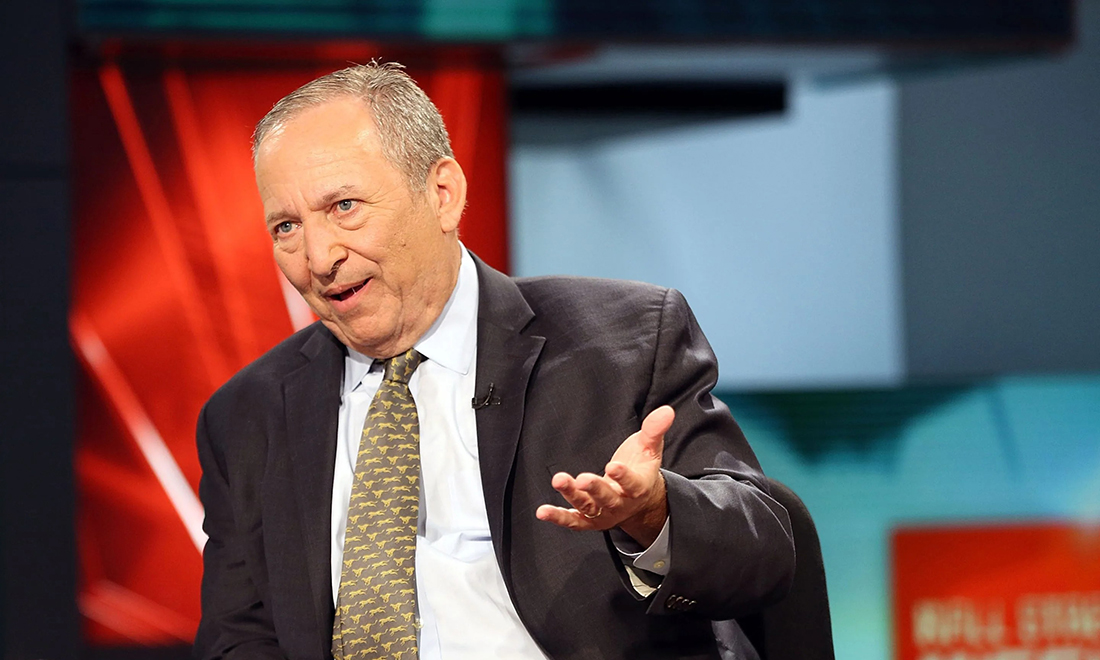
前美国财长拉里·萨默斯担心,“默默放弃进取”的趋势正在损害美国工人的生产率。
萨默斯是一位资深经济学家,曾担任哈佛大学(Harvard University)校长和世界银行(World Bank)首席经济学家。他会参与讨论这个在社交媒体上走红的新词汇,让人们觉得不可思议。
但在回应诺贝尔奖得主保罗·克鲁格曼周五在《纽约时报》发表的一篇专栏文章时,67岁的萨默斯表示,他认为“默默放弃进取”是美国第二季度工人生产率下降4.1%的主要原因之一。“默默放弃进取”是一个非正式的术语,是指人们只做最低限度的工作,放弃做超出工作范围的任务。
今年早些时候,这个词在TikTok和Instagram等平台上走红。多年来,听够了“努力要趁早”和“向前一步”这样的工作建议,80%的Z世代和千禧一代上班族认为现在的趋势对他们很有吸引力。
萨默斯担心,这些默默放弃进取的人们会导致通胀高企的状况进一步恶化。9月美国的通胀率达到8.2%。通胀持续会迫使美联储不得不继续加息,最终导致经济衰退。
他周一在一条推文中表示:“由于生产率增长停滞,原因可能是默默放弃进取的趋势,要想实现持续几个月将通胀维持在2%左右的目标,必须大幅减慢工资增长速度。我认为相信这种观念,必定会引发严重的经济衰退。”
在2005年发表的一篇文章中,时任旧金山联邦储备银行(Federal Reserve Bank of San Francisco)行长兼首席执行官的现任财政部长珍妮特·耶伦,分析了工人生产率下降与通胀之间的关系,这正是萨默斯最近所讨论的话题。
耶伦表示,工人生产率下降,会迫使企业招聘更多员工完成相同的工作。这导致成本上涨,而企业会通过涨价来转嫁成本。耶伦承认这是一个恶性循环,会在“很长时间内”带来“通胀上行压力”。
“默默放弃进取”是否是工人生产率下降的真正原因?
萨默斯认为工人生产率下降加剧通胀,他的观点有过去所做的研究提供佐证。但他所说的默默放弃进取所产生的影响,很快就遭到了同行的质疑。
萨默斯的话尤其是引起了一些进步经济学家们的不满。他主张,为了控制通胀应该降低工人工资(提高失业率),同时讨论了默默放弃进取的趋势如何演变成了对经济学家们如何看待劳动力的一场罗尔沙赫氏试验。进步经济学家们批评萨默斯称,不能简单地把提高失业率作为宏观经济解决方案。
Fastmarkets RISI资深经济学家达斯汀·贾尔伯特表示,在讨论美联储政策时,最好不要把关注点放在默默放弃进取这些缺少经验证据支持的趋势。
贾尔伯特在回应萨默斯时表示:“搞笑的是,一些重量级经济学家对于不遵循传统宏观框架下的通胀经验证据的同行大肆批评,但同时自己却认为默默放弃进取是真实存在的,而不是社交媒体上的一个梗。”
贾尔伯特还表示,萨默斯准确预测了通胀上涨,这一点值得称赞,但他可能“太相信劳动市场上的奇闻异事”,因为它们很契合他的“世界观”,尽管没有任何证据能够证明它们的存在。
前美联储经济学家、Sahm Consulting公司的创始人克劳迪亚·萨姆进一步表示,她对萨默斯提出的“经济分析和政策建议感到不安”。
她周一发推文回复萨默斯的评论称:“通货紧缩即将来临。美联储需要停止行动。它已经做得够多了。”
虽然默默放弃进取的趋势确实在社交媒体上流行,但在实际数据中并没有太多证据能证明这种趋势,而且工人生产率下降还有其他潜在原因,例如后疫情时代的工作技能缺口和消费者支出放缓等。
以员工参与度调查为例。2000年,盖洛普(Gallup)调查发现,26%的员工表示在工作中的参与度较高,有18%的受访者表示“工作参与度极低”。但去年,这两个比例分别为34%和16%。
盖洛普过去二十年的员工参与度调查持续表明,尽管最近TikTok上出现了各种新趋势,但员工的工作参与度却不降反升。
这种趋势或许会发生变化,但目前证明“默默放弃进取”对经济产生任何实际影响的证据有限。有许多人认为这种趋势只是代表人们在做自己的本职工作。
美国两党公共政策组织经济创新集团(Economic Innovation Group)的首席经济学家亚当·奥济梅克周一发推文称:“我并不认为默默放弃进取是真实存在的,或者正在影响生产率提高。我认为更有可能产生影响的是实际辞职者,以及大量人才流失和新员工入职。这会导致利率上涨和劳动力供应增长,事实上这些影响已经发生。”(财富中文网)
翻译:刘进龙
审校:汪皓
前美国财长拉里·萨默斯担心,“默默放弃进取”的趋势正在损害美国工人的生产率。
萨默斯是一位资深经济学家,曾担任哈佛大学(Harvard University)校长和世界银行(World Bank)首席经济学家。他会参与讨论这个在社交媒体上走红的新词汇,让人们觉得不可思议。
但在回应诺贝尔奖得主保罗·克鲁格曼周五在《纽约时报》发表的一篇专栏文章时,67岁的萨默斯表示,他认为“默默放弃进取”是美国第二季度工人生产率下降4.1%的主要原因之一。“默默放弃进取”是一个非正式的术语,是指人们只做最低限度的工作,放弃做超出工作范围的任务。
今年早些时候,这个词在TikTok和Instagram等平台上走红。多年来,听够了“努力要趁早”和“向前一步”这样的工作建议,80%的Z世代和千禧一代上班族认为现在的趋势对他们很有吸引力。
萨默斯担心,这些默默放弃进取的人们会导致通胀高企的状况进一步恶化。9月美国的通胀率达到8.2%。通胀持续会迫使美联储不得不继续加息,最终导致经济衰退。
他周一在一条推文中表示:“由于生产率增长停滞,原因可能是默默放弃进取的趋势,要想实现持续几个月将通胀维持在2%左右的目标,必须大幅减慢工资增长速度。我认为相信这种观念,必定会引发严重的经济衰退。”
在2005年发表的一篇文章中,时任旧金山联邦储备银行(Federal Reserve Bank of San Francisco)行长兼首席执行官的现任财政部长珍妮特·耶伦,分析了工人生产率下降与通胀之间的关系,这正是萨默斯最近所讨论的话题。
耶伦表示,工人生产率下降,会迫使企业招聘更多员工完成相同的工作。这导致成本上涨,而企业会通过涨价来转嫁成本。耶伦承认这是一个恶性循环,会在“很长时间内”带来“通胀上行压力”。
“默默放弃进取”是否是工人生产率下降的真正原因?
萨默斯认为工人生产率下降加剧通胀,他的观点有过去所做的研究提供佐证。但他所说的默默放弃进取所产生的影响,很快就遭到了同行的质疑。
萨默斯的话尤其是引起了一些进步经济学家们的不满。他主张,为了控制通胀应该降低工人工资(提高失业率),同时讨论了默默放弃进取的趋势如何演变成了对经济学家们如何看待劳动力的一场罗尔沙赫氏试验。进步经济学家们批评萨默斯称,不能简单地把提高失业率作为宏观经济解决方案。
Fastmarkets RISI资深经济学家达斯汀·贾尔伯特表示,在讨论美联储政策时,最好不要把关注点放在默默放弃进取这些缺少经验证据支持的趋势。
贾尔伯特在回应萨默斯时表示:“搞笑的是,一些重量级经济学家对于不遵循传统宏观框架下的通胀经验证据的同行大肆批评,但同时自己却认为默默放弃进取是真实存在的,而不是社交媒体上的一个梗。”
贾尔伯特还表示,萨默斯准确预测了通胀上涨,这一点值得称赞,但他可能“太相信劳动市场上的奇闻异事”,因为它们很契合他的“世界观”,尽管没有任何证据能够证明它们的存在。
前美联储经济学家、Sahm Consulting公司的创始人克劳迪亚·萨姆进一步表示,她对萨默斯提出的“经济分析和政策建议感到不安”。
她周一发推文回复萨默斯的评论称:“通货紧缩即将来临。美联储需要停止行动。它已经做得够多了。”
虽然默默放弃进取的趋势确实在社交媒体上流行,但在实际数据中并没有太多证据能证明这种趋势,而且工人生产率下降还有其他潜在原因,例如后疫情时代的工作技能缺口和消费者支出放缓等。
以员工参与度调查为例。2000年,盖洛普(Gallup)调查发现,26%的员工表示在工作中的参与度较高,有18%的受访者表示“工作参与度极低”。但去年,这两个比例分别为34%和16%。
盖洛普过去二十年的员工参与度调查持续表明,尽管最近TikTok上出现了各种新趋势,但员工的工作参与度却不降反升。
这种趋势或许会发生变化,但目前证明“默默放弃进取”对经济产生任何实际影响的证据有限。有许多人认为这种趋势只是代表人们在做自己的本职工作。
美国两党公共政策组织经济创新集团(Economic Innovation Group)的首席经济学家亚当·奥济梅克周一发推文称:“我并不认为默默放弃进取是真实存在的,或者正在影响生产率提高。我认为更有可能产生影响的是实际辞职者,以及大量人才流失和新员工入职。这会导致利率上涨和劳动力供应增长,事实上这些影响已经发生。”(财富中文网)
翻译:刘进龙
审校:汪皓
Former Treasury Secretary Larry Summers is worried that “quiet quitters” are hurting U.S. worker productivity.
A veteran economist who previously served as president of Harvard University and chief economist at the World Bank, Summers is an unlikely figure to be discussing the new phrase that has caught fire on social media.
But in response to Nobel laureate Paul Krugman’s Friday New York Times op-ed, the 67-year-old said that he believes “quiet quitting,” an informal term for people who give up on going above and beyond at their jobs and just do the bare minimum, is one of the key reasons that U.S. workers’ productivity fell 4.1% in the second quarter.
The term “quiet quitting” took off on platforms like TikTok and Instagram earlier this year. After years of receiving “rise and grind” and “lean in” work advice, 80% of Gen Z and millennial workers say the trend appeals to them.
Summers fears that these quiet quitters will exacerbate already elevated inflation, which came in at 8.2% in September, forcing the Federal Reserve to continue raising interest rates and spark a recession.
“Given dismal productivity growth, likely caused by quiet quitting, wage inflation will have to come down significantly if sustained months near 2% inflation is to be attained,” Summers wrote in a Monday tweet. “I do not understand the basis for believing this is likely without a meaningful recession.”
In a 2005 paper, Treasury Secretary Janet Yellen, who at the time served as president and chief executive officer of the Federal Reserve Bank of San Francisco, described the connection between falling worker productivity and inflation that Summers is discussing here.
She wrote that when workers’ productivity drops, it forces businesses to hire more employees to complete the same job. That leads to rising costs, which businesses then pass on by raising prices. It’s a vicious cycle that Yellen admitted can cause “upward pressure on inflation” for a “considerable period.”
Is ‘quiet quitting’ really the cause of slowing worker productivity?
Summers’ argument about falling worker productivity exacerbating inflation has been backed up by research in the past. But his comments about how quiet quitting has factored in were immediately questioned by his fellow economists.
Summers struck a nerve among progressives, in particular, because his argument that workers will have to be paid less (with higher unemployment) to rein in inflation touches on how the quiet quitting trend has turned into a kind of Rorschach test for how economists think about labor. The progressives who criticized Summers say it’s just not as simple as higher unemployment being the macroeconomic solution.
Dustin Jalbert, a senior economist at Fastmarkets RISI, said that it may not be the best policy to look at trends like quiet quitting that aren’t backed up by empirical evidence when discussing Fed policy.
“It’s pretty funny to see heavyweight economists dishing out critiques of those not following empirical evidence on inflation from traditional macro frameworks, yet in the same breath assuming quiet quitting is real and not a meme from social media,” Jalbert wrote in response to Summers.
Jalbert went on to say that Summers deserves credit for correctly predicting the rise of inflation, but that he may be “clinging to labor market anecdotes” that fit his “worldview” even when the evidence is lacking.
Claudia Sahm, a former Fed economist and the founder of Sahm Consulting, went a step further, saying that she is “deeply disturbed by the economic analysis and policy advice” that Summers is dishing out.
“Disinflation is coming. The Fed needs to back off. It’s done enough,” she wrote in a Monday tweet, responding to Summers’ comments.
While quiet quitting has undoubtedly taken off on social media, there isn’t much evidence of the trend in real-world data, and there are several other potential causes for slowing productivity, like a post-pandemic jobs skills gap and slowing consumer spending.
Take worker engagement polls as an example. In 2000, Gallup found that 26% of employees said they were engaged at work, while 18% said they were “actively disengaged.” But last year, 34% of workers said they were engaged at work, while only 16% said they were “actively disengaged.”
Gallup’s worker engagement polls from the past two decades consistently show that, despite any recent TikTok trends, workers have become more engaged at work, not less engaged.
That trend may change, but for now, there is limited evidence that “quiet quitting,” which many have pointed out is in fact people just doing their jobs, is having any real impact on the economy.
“I don’t think quiet quitting is real or affecting productivity growth,” Adam Ozimek, chief economist at bipartisan public policy organization Economic Innovation Group, wrote in a Monday tweet. “I think more likely it is actual quitting, and resulting high levels of churn and onboarding. And this will come down with rate hikes and labor supply growth, and indeed it already is.”






